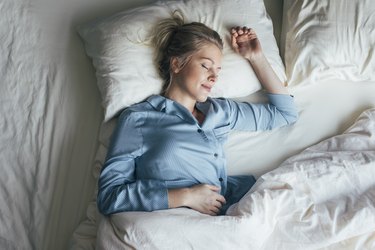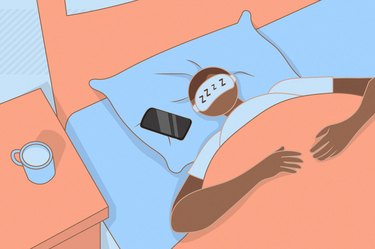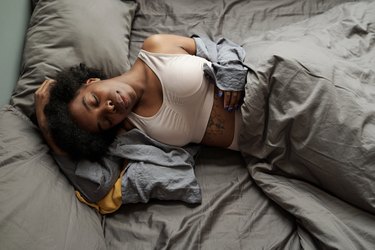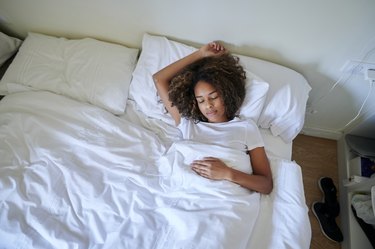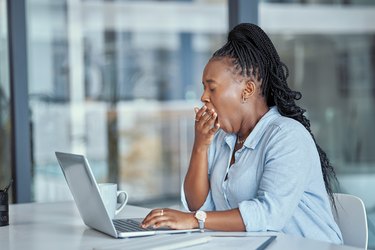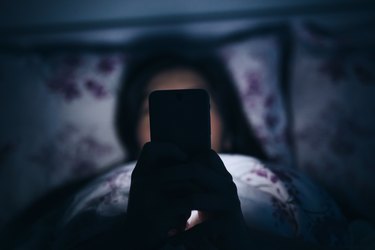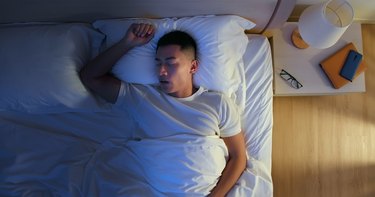
Deep sleep is what you call a night of solid, uninterrupted rest — but it's also a specific stage of sleep your body needs to rest and repair itself. And when you're not getting enough, you'll feel the effects pretty quickly.
Here's a look at what exactly deep sleep is, how it helps you feel your best and how to increase your deep sleep.
Video of the Day
Video of the Day
First, What Are the Stages of Sleep?
There are four stages of sleep, according to the National Institute of Neurological Disorders and Strokes (NINDS). They're divided into two categories: rapid eye movement (REM) sleep and non-REM sleep:
- Stage 1 non-REM (NREM) sleep: This is when you transition from being awake to sleeping. Your muscles relax, and your brain waves, heartbeat, eye movements and breathing all slow down, per NINDS. This is the stage of sleep when you're likely to experience the hypnic jerk.
- Stage 2 non-REM sleep: You're getting even more relaxed in this phase — the slowdown in your body continues, according to NINDs. "You spend more of your repeated sleep cycles in stage 2 sleep than in other sleep stages," per NINDS.
- Stage 3 non-REM sleep: This is also known as deep sleep or slow-wave sleep. This phase is key to feeling refreshed, and it happens more in the first half of the night, according to NINDS. It's harder for a person to wake up during periods of deep sleep, and if you are roused, it's normal to feel groggy or even disoriented for a few minutes.
- REM (or stage R) sleep: You'll experience REM sleep 90 minutes after falling asleep, according to NINDS. No surprise this phase is characterized by your eyes moving from side to side. Your body is more active during REM — complete with a heart rate and blood pressure close to when you're awake and fast breathing. But your muscles are temporarily paralyzed, so you don't act out your dreams — because it's during this phase that most of your dreaming occurs, per NINDS.
During the night, you'll cycle through these sleep phases, with a complete journey through all four taking roughly 90 to 110 minutes, according to the Cleveland Clinic. Your REM cycles will get longer (and deep cycles shorter) as the night processes, per the Cleveland Clinic.
"Each stage of sleep is important as part of our sleep cycle," says Douglas Kirsch, MD, the medical director of sleep medicine at Atrium Health who has served as the president of the American Academy of Sleep Medicine. "Slow-wave sleep [aka deep sleep] has typically been associated with impact on memory, hormonal balance and recovery from daytime activities," he says.
Deep Sleep vs. REM
Much about sleep, including the exact purpose of each phase, remains a bit mysterious. Still, there are several clear and known differences between deep and REM sleep (though one isn't "better" than the other):
REM Sleep
"REM sleep is the state where more vivid dreams occur, the heart rate gets more variable and the breathing is more irregular," Dr. Kirsch says.
Experts posit that this phase of sleep is important for memory consolidation and learning, per a March 2016 review in Current Biology. Brain development and emotional processing may also occur during REM sleep, says Michael Gallo, MD, sleep medicine physician at Miami Cardiac and Vascular Institute, part of Baptist Health South Florida.
This is "a curious phase," says John Saito, MD, who is board-certified in sleep medicine. It's like "[you're] entering the quantum verse, where your brain and body is almost as if it's awake," he says.
A temporary paralysis in your limbs stops you from going through the physical motions of whatever is taking place in your dreams, per NINDS. (Fun fact: That's also why you can't sneeze in your sleep.)
Have you ever gone to bed noodling over the phrasing in a work email or how to approach a tricky issue, then woken up with the solution feeling crystal-clear? This kind of problem-solving usually occurs during REM sleep, Dr. Saito says.
Deep Sleep
During deep sleep, there's no eye movement or muscle activity. After the slow-down experienced in earlier sleep stages, your body is now fully easing into rest.
Deep sleep is "the most healing phase of non-REM sleep," Dr. Saito says — it's restorative for your heart and your brain, he adds. While your body is experiencing a bit of a slowdown, with your heart rate falling and brain waves slowing, your brain is doing important work.
In fact, this is when the glymphatic system in your brain gets to work. Think of this as your brain's sanitation department, Dr. Saito says — it's clearing away waste from the central nervous system. That matters: One bit of debris that can build up — a protein called beta-amyloid — is associated with Alzheimer's disease, per Houston Methodist.
Along with clearing away waste, deep sleep may be important for cognitive function and hormone regulation, Dr. Gallo says. And, deep sleep also helps keep your immune system strong, per November 2021 findings in Communications Biology.
How Many Hours of Sleep Should You Get?
Experts have a recommendation when it comes to how many hours of sleep you need each night: At least seven, per the Centers for Disease Control and Prevention (CDC).
But, "the ideal amount may vary from person to person," Dr. Kirsch notes — people need to clock more hours of sleep as babies and children, for example.
And while seven hours is the minimum, you may find that it doesn't cut it for you: "Many people feel better with closer to eight hours of sleep," Dr. Kirsch says, or even nine or 10.
How Much REM Sleep Do You Need?
Giving specifics on how much sleep you need in various stages is a bit challenging. "Typically REM sleep accounts for 20 to 25 percent of the sleep time," Dr. Kirsch says.
That is, if you're sleeping seven hours each night, you'll spend about 84 to 105 minutes in REM sleep, or somewhere around an hour and a half, give or take.
How Much Deep Sleep Do You Need?
Between 10 to 15 percent of your sleep is deep sleep, according to the National Center for Biotechnology Information. (Both Dr. Gallo and Dr. Saito gave a slightly different estimate: 10 to 20 percent.)
Assuming you're clocking seven hours of shut-eye, then you'll likely get about 42 to 84 minutes of deep sleep.
"There are no recommendations for deep sleep as it is not typically controllable or clearly measurable in typical day-to-day life," Dr. Kirsch notes.
Of note: Young people tend to get more deep sleep, and older people get less of it, though the reasons why aren't clear.
What Could Cause You to Get Less Deep Sleep?
While there’s no set-in-stone guideline for how much deep sleep a person requires, you’ll likely notice if you don’t get enough. (More on that later.)
Many things can lead to decreased amounts of deep sleep.
“An underlying medical condition, sleep disorder, substance use (caffeine, alcohol, illicit drugs) or medications can all reduce deep sleep in an individual,” Dr. Gallo says.
Plus, not getting enough overall sleep means you’re not getting as much deep sleep, Dr. Saito points out. Here, timing matters: You get more deep sleep in the start of your shut-eye, and more REM sleep later in the night. Go to bed at your usual time of 10 or 11 p.m., and you’ll get the deep and REM sleep you need. But if you stay up late — a 2 a.m. bedtime, for example — but wake up at your usual time, you’ll cut into your deep sleep, he says.
How to Track Your Deep Sleep
There's value to sleep trackers, which include watches, wearables and bedside sensors. They're "a good tool to give you an idea in broad strokes of the quantity of [your] sleep," Dr. Saito says.
But while some claim to measure individual stages of sleep — including deep sleep — the information is just a guesstimate, according to the Mayo Clinic.
Only a clinical sleep study measuring your brain waves can tell for sure how much of your sleep is deep sleep. "The definition of deep sleep from a wearable consumer device is different typically than that measured by a medical sleep study," Dr. Kirsch says.
That's not to say wearables aren't useful — they serve to:
- Reveal how many hours of shut-eye you get: "I generally suggest to my patients that they focus on spending the ideal amount of time in bed and less on tracking the specific sleep stages reported by the wearable device," Dr. Kirsch says.
- Show trends and changes in your sleep: "The devices could be used as a tool to set personal goals and assess change over time," Dr. Gallo points out.
Just keep in mind that a tracker can only tell you how much you're sleeping — simply using one won't improve your sleep. If a tracker shows you're falling short on your nightly shut-eye, it's up to you to make the changes necessary to get more sleep.
While trackers can't reveal how much deep sleep you're getting, you can look to other signals that reveal you might be falling short on sleep, which in turn means you're getting insufficient deep sleep, such as:
- Feeling tired or irritable during the day — if you find yourself relying on caffeine to get through a day, it signals you're not getting the total sleep you need, per the CDC
- Trouble concentrating
- Over time, you might also notice you feel depressed, according to the NCBI
- Insufficient sleep can also have an effect on your memory as well as your ability to function during the daytime, according to Dr. Kirsch
How to Get More Deep Sleep
Generally, the best route to getting more deep sleep is to get more sleep overall. "Good sleep habits will lead generally to better quality sleep, including more N3 sleep," Dr. Kirsch says. Here are some strategies for getting closer to your nightly quota.
1. Get Enough Sleep
Remember, the generally recommended guideline for adults is seven hours — at least!
Your bedtime can feel negotiable in a way that your morning alarm clock isn't because most of us need to get up to ferry kids to school or get ourselves to work. But stay up late (engaging in some revenge bedtime procrastination, say) and you'll cut into your overall sleep, which in turn means you'll get less deep sleep.
2. Practice Good Sleep Hygiene
Start adopting habits that up your chances for falling asleep quickly and staying asleep. The CDC recommends you:
- Be consistent with your bedtime and wake time (all seven days of the week matter here, Dr. Kirsch notes — no matter how tempting it is to sleep in on the weekend)
- Keep your bedroom dark and quiet
- Set the thermostat at a comfortable temperature
- Keep electronic devices like tablets and smartphones out of your bedroom
- Turn off the TV
In general, aim to avoid screens in the hours leading up to bedtime — not only is scrolling social media stimulating, which means it doesn't get you in a restful frame of being, but these devices emit blue light.
Better before-bed wind-down activities include taking a warm bath or shower, or reading a (print) book.
3. Get Exercise
Moving more during the day can help you sleep more soundly at night in general.
Aim for regular daytime exercise, Dr. Kirsch says. Note that moderate aerobic exercise may be particularly meaningful for deep sleep, per Johns Hopkins Medicine.
4. Watch Your Caffeine and Alcohol
Both can lead to worse quality sleep.
Caffeine has a wake-up effect, helping you feel alert, per the FDA. But it also has a long half-life of four to six hours — that means that a 5 p.m. latte could affect your sleep when you're going to bed at 10 o'clock.
And while alcohol may help you doze off more easily, it can lead to sleep disruptions that make it harder to sleep deeply, according to the Cleveland Clinic.
Tip
Certain medications may also interfere with specific stages of sleep, according to the Cleveland Clinic. If you're taking meds and have tried all of the above but you're still not waking up refreshed, talk to your doctor about whether it could be due to your prescription.
When to See a Sleep Specialist
There are a lot of reasons to see a sleep specialist, including the following, per our sleep experts:
- Snoring and sleep apnea
- Fragmented nighttime sleep
- Feeling sleepy during the day
The presence of sleep disorders is another reason to seek help. Some are particularly associated with deep sleep. That includes sleepwalking, per Penn Medicine. Night or sleep terrors also occur during deep sleep, according to the Mayo Clinic.
Sleep disorders, snoring, sleep apnea — all of these things can lead to you clocking fewer zzzs. Insufficient sleep has major long-term health consequences and is linked to several health conditions, including diabetes, obesity, cardiovascular disease and depression, per the CDC. And, no surprise, not getting enough sleep means memory problems, mood changes and struggles with functioning the following day.
Bottom line: "Sleep is vital to survival, so please get seven or more hours of sleep per night and seek medical help if you think your sleep quality and/or sleep quantity is compromised," Dr. Gallo says.
- National Institute of Neurological Disorders and Strokes: "Brain Basics: Understanding Sleep"
- Cleveland Clinic: "Sleep Basics"
- Current Biology: "The Biology of REM Sleep"
- Houston Methodist: "Harnessing the Glymphatic System to Improve Brain Health"
- Communications Biology: "Harnessing the Glymphatic System to Improve Brain Health"
- Centers for Disease Control and Prevention: "How Much Sleep Do I Need?"
- National Center for Biotechnology Information: "Sleep Disorders and Sleep Deprivation: An Unmet Public Health Problem."
- Mayo Clinic: "Sleep-tracking devices: Dos and don'ts"
- CDC: "Basic Information about Sleep and Fatigue"
- NCBI: "Sleep Deprivation"
- CDC: "Tips for Better Sleep"
- Johns Hopkins Medicine: "Exercising for Better Sleep"
- FDA: "Spilling the Beans: How Much Caffeine is Too Much?"
- Penn Medicine: "Sleep Walking"
- Mayo Clinic: "Sleep terrors (night terrors)"
- CDC: "Sleep and Chronic Disease"
Is this an emergency? If you are experiencing serious medical symptoms, please see the National Library of Medicine’s list of signs you need emergency medical attention or call 911.
